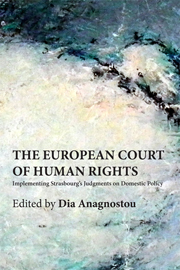Book contents
- Frontmatter
- Contents
- The contributors
- Acknowledgements
- Introduction: Untangling the domestic implementation of the European Court of Human Rights' judgments
- Part I INSTITUTIONAL DYNAMICS OF DOMESTIC IMPLEMENTATION
- Part II LEGAL MOBILISATION AND THE POLITICAL CONTEXT OF IMPLEMENTATION
- List of European Court of Human Rights judgments and European Commission on Human Rights cases
- Index
Introduction: Untangling the domestic implementation of the European Court of Human Rights' judgments
Published online by Cambridge University Press: 05 April 2014
- Frontmatter
- Contents
- The contributors
- Acknowledgements
- Introduction: Untangling the domestic implementation of the European Court of Human Rights' judgments
- Part I INSTITUTIONAL DYNAMICS OF DOMESTIC IMPLEMENTATION
- Part II LEGAL MOBILISATION AND THE POLITICAL CONTEXT OF IMPLEMENTATION
- List of European Court of Human Rights judgments and European Commission on Human Rights cases
- Index
Summary
Over the past couple of years, the European Convention of Human Rights (hereafter ECHR or Convention) and its judicial arm in Strasbourg have attracted renewed scholarly interest. The European Court of Human Rights (hereafter ECtHR or Court) is a paradigmatic instance of a transnational tribunal that fundamentally differs from an international court based on interstate processes: it allows individuals, but also other civil society actors, to raise claims against states, once they exhaust domestic remedies. Over time, poised between judicial restraint and activism, the Court has expansively interpreted the basic civil and political rights contained in the Convention, as well as scrutinising states' restrictions of those rights. Through individual petitions, a large array of state laws and practices, including areas that are sensitive for national interests and security, such as those pertaining to minorities and immigrants, have come under its purview. Through both dynamic interpretation and enforcement, the ECtHR has over time substantially upgraded and expanded human rights standards across established European democracies, and also vis-à-vis the democratising states of the ex-communist world. Having come a long way from its obscure origins in the 1950s, it is now increasingly constitutionalised and it is characterised as the single most important rights-protecting tribunal in the world.
Among the Convention's most remarkable characteristics is the obligation of national authorities to implement adverse judgments issued by the ECtHR. This involves a decentralised system of institutions and actors assigned responsibility for implementation at the national level, along with robust supervisory and enforcement mechanisms at the European level.
- Type
- Chapter
- Information
- The European Court of Human RightsImplementing Strasbourg's Judgments on Domestic Policy, pp. 1 - 24Publisher: Edinburgh University PressPrint publication year: 2013



